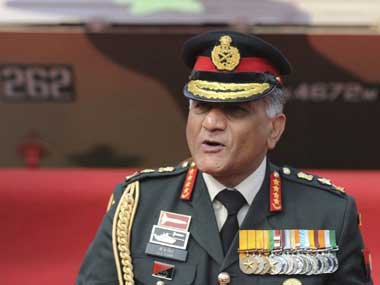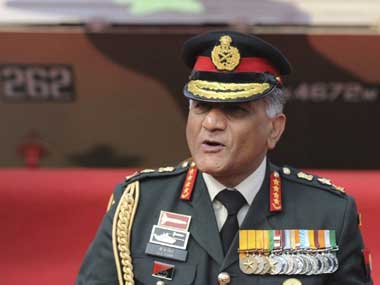The Supreme Court’s intervention in the dispute between the government and the Army chief over the latter’s date of birth may have enforced a ceasefire of sorts, but disquieting distrust still appears to linger beneath the surface. And last week’s reports that Defence Minister AK Antony’s office had been bugged, which the government denied, are feeding that element of distrust.
The Times of India reports
, citing unidentified government sources, that the government is looking into an “anonymous, detailed complaint” that makes several allegations against Army chief Gen VK Singh. [caption id=“attachment_216131” align=“alignright” width=“380” caption=“The charge that the Army authorised electronic surveillance of the government is serous. AFP”]
 [/caption] One of those allegations, the report suggests, is that the Army chief deployed electronic surveillance devices to tap phone conversations in order to know the government’s mind on the dispute relating to Singh’s date of birth.
A report in India Today last week
, again citing unidentified government sources, too transmitted the suspicion that the Army had been “snooping on phone conversations around South Block” by deploying ‘off-the-air interceptors’… over the past year.” These interceptors are portable snooping devices – about the size of a desktop computer – that can tune in to telephone conversations, and had been procured from Ukraine for counter-insurgency operations in Jammu and Kashmir and the northeastern states. But they had deployed not in the sensitive border areas, but at two locations – in Sena Bhavan and the Delhi Cantonment, the media reports said. The Army is not authorised to tap phones, although that authority rests with nine other designated agencies. These reports also channelled the government’s concern that a shadowy unit of the Military Intelligence had been carrying on such electronic surveillance, although it wasn’t immediately clear who was being targeted for such surveillance. The government’s investigation of the alleged snooping by the Army on governmental goings-on accentuates the distrust between the two in the dispute over the Army chief’s date of birth. Singh had wanted the government to treat his year of birth as 1951, and not 1950, and even filed a petition before the Supreme Court to argue his case. But after the Supreme Court intervened, he withdrew his petition. The government subsequently served a notice of retirement on Singh, and named his successor. But there is still a bit of bad blood between the Army and the government, as evidenced by the cancellation by the government of the Army chief’s planned visit to Israel, and the ongoing investigation of the grave allegation of electronic surveillance. The Army chief retires in May, but going by the current atmospherics, the last few months of his tenure may test the limits of the relationship between the government and the Army, which bodes ill for smooth governance.
[/caption] One of those allegations, the report suggests, is that the Army chief deployed electronic surveillance devices to tap phone conversations in order to know the government’s mind on the dispute relating to Singh’s date of birth.
A report in India Today last week
, again citing unidentified government sources, too transmitted the suspicion that the Army had been “snooping on phone conversations around South Block” by deploying ‘off-the-air interceptors’… over the past year.” These interceptors are portable snooping devices – about the size of a desktop computer – that can tune in to telephone conversations, and had been procured from Ukraine for counter-insurgency operations in Jammu and Kashmir and the northeastern states. But they had deployed not in the sensitive border areas, but at two locations – in Sena Bhavan and the Delhi Cantonment, the media reports said. The Army is not authorised to tap phones, although that authority rests with nine other designated agencies. These reports also channelled the government’s concern that a shadowy unit of the Military Intelligence had been carrying on such electronic surveillance, although it wasn’t immediately clear who was being targeted for such surveillance. The government’s investigation of the alleged snooping by the Army on governmental goings-on accentuates the distrust between the two in the dispute over the Army chief’s date of birth. Singh had wanted the government to treat his year of birth as 1951, and not 1950, and even filed a petition before the Supreme Court to argue his case. But after the Supreme Court intervened, he withdrew his petition. The government subsequently served a notice of retirement on Singh, and named his successor. But there is still a bit of bad blood between the Army and the government, as evidenced by the cancellation by the government of the Army chief’s planned visit to Israel, and the ongoing investigation of the grave allegation of electronic surveillance. The Army chief retires in May, but going by the current atmospherics, the last few months of his tenure may test the limits of the relationship between the government and the Army, which bodes ill for smooth governance.
‘Truce’ shattered: Govt is still gunning for the General
FP Staff
• March 5, 2012, 07:03:32 IST
The government is investigating a complaint that the Army tapped into phone conversations to know the government’s mind on the dispute over the Army chief’s date of birth.
Advertisement
)
End of Article